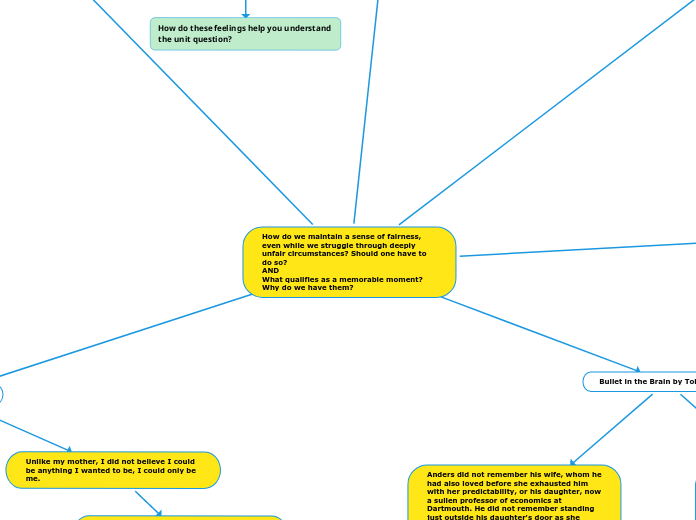How do we maintain a sense of fairness, even while we struggle through deeply unfair circumstances? Should one have to do so?
AND
What qualifies as a memorable moment? Why do we have them?
The Bells
Half a Day
Put context here: What is happening in this part of the story?
"I'm not punishing you," he said, laughing. "School's not a punishment. It's the factory that makes useful men out of boys. Don't you want to be like your father and brothers?"
The son isn't reluctant to going to school for the first time. He feels as if he is being punished and is wishing to return home instead. The father encourages his son to step up and grow, to go forward like he rest of them.
How do specific words in the quote relate to the unit question?
How do these words convey feelings and meaning?
How do these feelings help you understand the unit question?
Handsomest Drowned Man in the World
That was how they came to hold the most splendid funeral they could ever conceive of for an abandoned drowned man. Some women who had gone to get flowers in the neighboring villages returned with other women who could not believe what they had been told, and those women went back for more flowers when they saw the dead man, and they brought more and more until there were so many flowers and so many people that it was hard to walk about.
The people of the village are essentially celebrating this man's death and using it as a way to help them feel better. they are encouraged and open to new things now with the loss of this man being the root cause.
splendid, flowers, so many
This conveys a feeling of happiness and excitement, it also shows how the people are not mourning the drowned man anymore but their freedom of ideas.
This quote helped me understand the unit question because it is memorable for the people in the village because they are either, celebrating the introduction of new ideas within themselves or the scapegoat of the man to help free them from their isolated ideas.
he looked so forever dead, so defenseless, so much like their men that the first furrows of tears opened in their hearts. It was one of the younger ones who began the weeping. The others, coming to, went from sighs to wails, and the more they sobbed the more they felt like weeping,
Here, the women are attending to the dead man and preparing his funeral. They look at his face and see how defenseless and weak his face looks when he is dead whilst he seems so strong every where else. They see their husbands and men in his face.
Furrows of tears, Opened their hearts, Weeping, Wails
These words convey a feeling of "washed away ideas" in the women. They are exposed to this new idea of what a man can look like even though he is dead they can see that the men they looked up to for all this time are not what they seem to be. this being a production of their isolation.
This helps me understand the unit question of memories. Sometimes a memorable moment can be a time you have been exposed to the truth. Here the women are enlightened on the truth that there are stronger men than the ones they see and it drags their idea on the men around them down.
Livebinder Article Title
Put a quote here
How does this relate to a unit question?
How does the question relate to the world outside the text?
Bullet in the Brain by Tobias Wolff
Anders had conceived his own towering hatred of the teller, but he immediately turned it on the presumptuous crybaby in front of him. "Damned unfair," he said. "Tragic, really. If they're not chopping off the wrong leg, or bombing your ancestral village, they're closing their positions."
The bank tellers and cashiers are working at a slower pace as usual and eventually stop working entirely. This frustrates Anders so he uses sarcasm as a way to deal and lash back at his idea of this unfair situation.
Dammed, Unfair, Tragic
The words convey a feeling of anger and discomfort in our main character. He is beyond the typical yelling or whining but a back handed way.
This helps us understand the unit question by highlighting the uncertainty of living and how sometimes it can be unfair. The people at the bank are living their own lives and have their own issues but Anders is blind to that. Showing that it is important to maintain a fair mindset when in situations because things are happening everywhere.
Anders did not remember his wife, whom he had also loved before she exhausted him with her predictability, or his daughter, now a sullen professor of economics at Dartmouth. He did not remember standing just outside his daughter's door as she lectured her bear about his naughtiness and described the truly appalling punishments Paws would receive unless he changed his ways.
After Anders was shot dead inside the bank for being smart remarked. He. looks back on past memories and the people he spent his time with and remises on these moments, whilst still judging them and critiquing their mistakes.
The specific words that relate to the unit question are unless, naughtiness and predictability.
These words convey feelings of criticism and judgement. Anders uses these words even after death to show his resentment for mistakes and things he doesn't like or that ticks him.
This helps us understand the unit question because it shows how Anders coped with his idea of unfairness, being peoples mistakes or differences/similarities. He balanced fairness with the customers in the bank and the robbers, even his loved ones while dead. He judged everyone the same to compensate for the frustration they give him and how they could judge him as well.
Two Kinds by Amy Tan
Unlike my mother, I did not believe I could be anything I wanted to be, I could only be me.
Jing felt like she was unable to be successful because of her mothers lack of support and harsh words.
Did not believe, be anything, wanted to be
They convey a feeling of defeat for the main character, she isn't hopeful in herself and accomplishments. This is important because you need your mother/father's support to be successful and Jing does it alone which says alot about her character.
I think that it relates to the UQ because its showing how she will remain fair to her mother and still care for her, even when it feels that the energy isn't reciprocated fairly. In this case, Jing shouldn't have to but doesn't regardless.
If we ask Jing-mei wash dish, she hear nothing but music. It's like you can't stop this natural talent." And right then I was determined to put a stop to her foolish pride.
Jing has always been put down by her mother and shunned for being different and not being perfect. It resulted in Jing having internal hatred for herself and not supporting her dreams properly to tend to her mother. When she finally gets a hold of this mindset and grows to be successful, her mom tries to take the spotlight.
Foolish, Pride, Determined
These words convey a sense of hypocrisy in the mind of Jing and is showing how things are unfair and people can wrong others but fairness isn't only being kind but being unkind as well. To take a stand when something is wrong.
This relates to the unit question because it shows how you can be fair in many ways and that some people can need an equal amount of force dished to them to make them understand they aren't being fair. This can serve as a fairness to you if you're being wrong in the situation like Jing.









